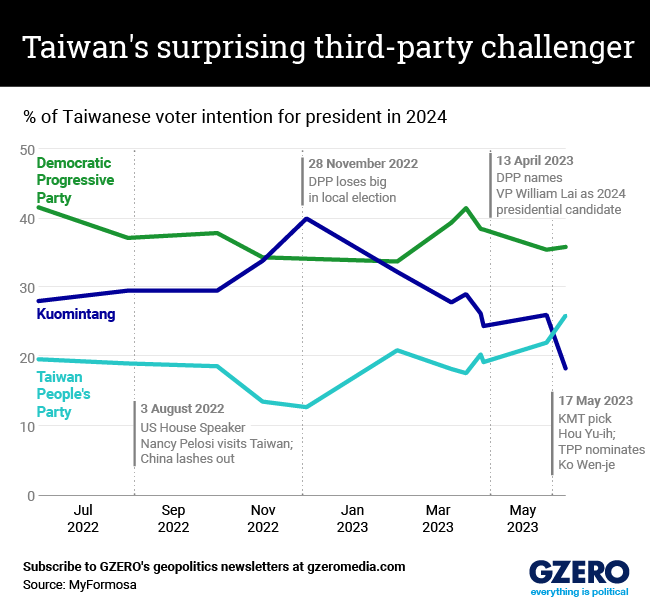The Graphic Truth: Taiwan's surprising third-party challenger
Taiwan goes to the polls in January 2024 in what is likely the most consequential presidential election since the self-ruled island embraced democracy in 1996. As usual, the vote will be all about ... China.
Looking to replace term-limited President Tsai Ing-wen are VP William Lai, from the ruling Democratic Progressive Party, and Hou Yu-ih, a former top cop nominated by the opposition Kuomintang Party. The DPP and the KMT have always dominated Taiwanese politics, with the former taking a tougher line on relations with the mainland. But this time a third-party candidate wants to give them a run for their money.
Enter Ko Wen-je, a two-time former mayor of the capital, Taipei, who's running on the first-ever presidential ticket of the upstart Taiwan People's Party. Ko — who sometimes expresses himself awkwardly because he has Asperger’s syndrome — has been grabbing headlines after recently placing second in the presidential polls ahead of Hou.
Ko is gaining traction thanks to his popularity with young voters fed up with the establishment parties, says Eurasia Group analyst Ava Shen. But he also has many detractors.
"To those who support him, Ko is a much-needed third force that could alter the polarized landscape in Taiwanese politics," Shen explains. "To those who are critical of him, Ko is an inexperienced politician with controversial gaffes and an unclear platform, unfit for national government."
Still, the TPP candidate offers something different to voters: Ko doesn't bang people over the head about relations with China, preferring to focus on domestic issues such as energy and housing — as if he were running for local office instead of the presidency.
When he does talk about how he'd deal with Xi Jinping, Ko styles himself as a pragmatist who will neither provoke China like the DPP nor defer to it like the KMT. Yet, his enemies see the TPP presidential hopeful as a tad closer to KMT appeasement, fueling speculation that Ko might be a Manchurian Candidate.
Shen doesn’t buy it. “Beijing still prefers Hou and the KMT to win; it is not yet clear how Beijing feels about Ko and the TPP,” she says. “Nevertheless, Ko's position on cross-strait relations appears to be more moderate than Lai’s — which could appeal to China.”
Whether or not Ko is cozier with Xi than he lets on, he faces long odds of winning Taiwan's presidency, since the TPP lacks an established voter base. What's more, KMT supporters are putting pressure on Ko to become Hou's running mate and consolidate the anti-DPP vote.
So far, though, the TPP hopeful says he's in the race to win it. But if by doing so he ends up handing the election to Lai, Beijing will not be pleased.
